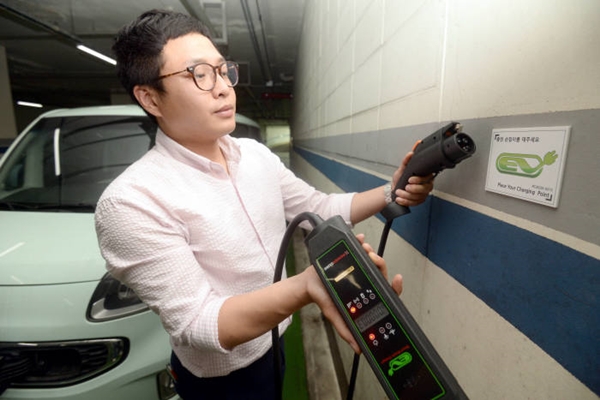KT is going to install 10,000 sockets (telecommunication point) for charging electric vehicles in Seoul and major metropolitan areas. These sockets will be composed of a device (RFID tag) that distinguishes users to determine the billing of electricity that is uses and electric sockets that had gone through safety inspection. Because there won’t be same chargers as previous chargers, there won’t be any rejections from residents and they will be irrelevant to landscape of cities. It is predicted that these will contribute in increasing number of use of electric vehicles by residents that live in apartments.
According to an industry, KT and PowerCube, which is a business that specializes in chargers, installed 9,000 portable chargers at 650 parking lots of apartments, industrial complexes, and buildings with Seoul and metropolitan areas at the center and they will add 1,000 more chargers soon. Although PowerCube only installed about 2,000 sockets last year, it installed 10,000 sockets in just a month with help from KT.
KT has been persuading management offices of apartments, industrial complexes, and buildings to establish these sockets by investing $349,000 (400 million KRW) and introducing task forces, which are made up of 40 people, per branch in South Korea. It has been working on safety inspection of electricity such as checking substations' capacities and attaching RFID tags. As South Korean Government recently declared that it will supply 20,000 portable chargers by end of this year to achieve supply of 8,000 electric vehicles, KT’s business has also gained momentum.

Unlike fixed charging facilities that need exclusive parking structures, portable chargers just need normal sockets in parking structures and recognize RFID tags. Payments for using electricity will take place individually based on amount of use of electricity. Although complicated procedures such as receiving consents from residents to occupy space within parking structures were needed to establish fixed chargers at apartments in the past, portable chargers do not have to go through such procedures.
Because these chargers need to verify users’ tags, they can prevent people from using electricity from public parking structures without any permission. Also while $873 to $1750 (1 million to 2 million KRW) was needed to relocate chargers either when electric vehicle users move or when one purchases an used electric vehicle, portable chargers do not require such expenses. To actively supply portable chargers, South Korean Government will supply chargers for free and give $349 (400,000 KRW) up to 5 chargers to install sockets at apartments’ parking structures that do not have electricity sockets.
KT will be in charge of LTE telecommunication service for sending users’ certifications and amount of electricity uses to charge electric vehicles while PowerCube supplies cable-type portable chargers with meters.
“Problems regarding customers that live at apartments and had to give up on purchasing electric vehicles even when they applied for purchase of electric vehicles because they did not receive consents from other residents will be solved by installing and operating 10,000 sockets.” said Director Moon Seong-wook of KT. “We are also planning to launch other services that are related to electric vehicles by adding our capabilities.”
Staff Reporter Park, Taejon | gaius@etnews.com